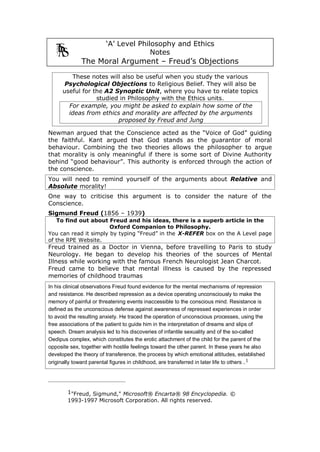
Freud's Objections to the Moral Argument
- 1. ‘A’ Level Philosophy and Ethics Notes The Moral Argument – Freud’s Objections These notes will also be useful when you study the various Psychological Objections to Religious Belief. They will also be useful for the A2 Synoptic Unit, where you have to relate topics studied in Philosophy with the Ethics units. For example, you might be asked to explain how some of the ideas from ethics and morality are affected by the arguments proposed by Freud and Jung Newman argued that the Conscience acted as the “Voice of God” guiding the faithful. Kant argued that God stands as the guarantor of moral behaviour. Combining the two theories allows the philosopher to argue that morality is only meaningful if there is some sort of Divine Authority behind “good behaviour”. This authority is enforced through the action of the conscience. You will need to remind yourself of the arguments about Relative and Absolute morality! One way to criticise this argument is to consider the nature of the Conscience. Sigmund Freud (1856 – 1939) To find out about Freud and his ideas, there is a superb article in the Oxford Companion to Philosophy. You can read it simply by typing “Freud” in the X-REFER box on the A Level page of the RPE Website. Freud trained as a Doctor in Vienna, before travelling to Paris to study Neurology. He began to develop his theories of the sources of Mental Illness while working with the famous French Neurologist Jean Charcot. Freud came to believe that mental illness is caused by the repressed memories of childhood traumas In his clinical observations Freud found evidence for the mental mechanisms of repression and resistance. He described repression as a device operating unconsciously to make the memory of painful or threatening events inaccessible to the conscious mind. Resistance is defined as the unconscious defense against awareness of repressed experiences in order to avoid the resulting anxiety. He traced the operation of unconscious processes, using the free associations of the patient to guide him in the interpretation of dreams and slips of speech. Dream analysis led to his discoveries of infantile sexuality and of the so-called Oedipus complex, which constitutes the erotic attachment of the child for the parent of the opposite sex, together with hostile feelings toward the other parent. In these years he also developed the theory of transference, the process by which emotional attitudes, established originally toward parental figures in childhood, are transferred in later life to others ..1 1"Freud, Sigmund," Microsoft® Encarta® 98 Encyclopedia. © 1993-1997 Microsoft Corporation. All rights reserved.
- 2. The Moral Argument – Freud’s Objections Freud believed that an individual developed psychological mechanisms through their relationships with their parents. These mechanisms, buried in the subconscious, are what we know as The Conscience. Freud thought that there were various functions of the mind. He divided it into three sections: The Ego The Id The Superego The ego begins to The Id is usually This part of the develop from birth. referred to as the mind controls the As the he begins to unconscious. It is impulses of the Id. experience the the seat of biological The Superego external world, the impulses, and is develops from early ego begins to controlled by the childhood as modify the baby’s Pleasure Principle. parents and society behaviour, This compels the as the child tries to controlling socially person to find instant conform to their unacceptable gratification – usually expectations. impulses. this is associated with sexual drives. Freud believed that the Conscience develops as a child - he also believed that the child develops a sexual attraction to their (opposite sex) parent. This then develops into a jealousy of the (same sex) parent. For example – a small boy may develop a sexual attraction for their mother, and a jealousy of the close relationship between mother and father. OOOEEER! Society frowns on these feelings, so the child represses the feelings in their sub-conscious. They worry about disappointing their parents, and become conditioned into behaving the way that their parents would approve of. Conscience therefore is based on the guilt of disappointing parents, and on the pressure of conforming to society’s concepts of appropriate behaviour. It is an internal action of the mind, and is basically the result of conditioning from society and family. Modern Psychology has developed Freud’s argument. They argue that there are different levels of development in the conscience. The Mature Conscience The Immature Conscience A Mature Conscience is able to The Immature Conscience is use reason to establish the best more emotional, concerned course of action. about acceptance by others rather than a rational evaluation of the situation. 2
- 3. The Moral Argument – Freud’s Objections Mature Conscience Immature Conscience The mature conscience The Immature Conscience is rationalises its decisions. It more concerned with “fitting in” works out what is right and and approval. It bases its wrong through an evaluation of decisions on emotion, rather values. than reason. J. L. Mackie argues that the evidence for biological, sociological and psychological explanations for conscience means that the Moral Argument no longer has a valid defence. 3